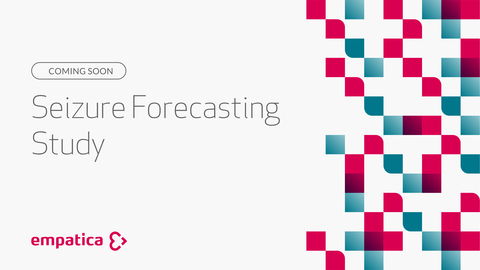Empatica, a digital health and AI company developing medical-grade wearables and digital biomarkers for health monitoring and diagnostics, today announced plans to launch a first-of-its-kind study aimed at developing a seizure forecasting algorithm for people living with epilepsy, based on real-world data collected using its technology.
This press release features multimedia. View the full release here: https://www.businesswire.com/news/home/20231130692933/en/

Empatica announces plans to develop an AI-based seizure forecasting algorithm based on wearable real-world Data (Graphic: Business Wire)
More than 3 million Americans suffer from epilepsy, according to numbers from the Centers for Disease Control. And around one third of people with epilepsy have refractory epilepsy which occurs when medications no longer control seizures1. Epileptic seizures are disruptive health events that can have a significant negative impact on quality of life and increase risk of injury and death for people with epilepsy. This study is designed to identify individualized periods of seizure risk for patients with epilepsy, using biomarker viability and patterns in patient lifestyle data as inputs to a forecasting algorithm.
“Seizure forecasting has long been among the most-requested features for people with epilepsy. We are excited to announce our plans to begin a large clinical study aimed at using wearable technology to enable reliable seizure forecasting,” said Dr. Rosalind Picard, Co-Founder and Chief Scientist at Empatica. “Patients with epilepsy understand the toll that uncertainty around seizures takes and we hope that this study will help give them better control over their life, reducing stress and perhaps also enabling early interventions that ultimately reduce or prevent seizures from happening.”
This study builds on Empatica’s proven experience in monitoring neurological conditions like epilepsy. Empatica’s Embrace smartwatch is the first and only FDA-cleared wearable technology for detecting possible convulsive seizures, and one of the first AI-enabled medical products cleared by the FDA. Empatica’s wearables have also been previously used to successfully collect data shown to forecast seizures in a peer-reviewed study by the Mayo Clinic, King’s College and University of Melbourne, funded by the Epilepsy Foundation through the Seizure Gauge initiative2. Through the upcoming study, Empatica plans to use its expertise in AI and machine learning, as well as its access to the largest real-world dataset of convulsive seizures, for the development of the seizure forecasting algorithm.
This study also furthers Empatica’s work in developing AI-powered predictive algorithms. In 2021, Empatica developed an AI-based predictive algorithm which was CE-marked for medical use in the EU, focused on providing a warning when early signs of respiratory infections, including Covid-19, are detected.
Recruitment for the study will begin in early 2024. Individuals who are interested in being contacted for study participation when recruitment begins can visit empatica.com/seizure-forecasting to learn more.
About Empatica
Empatica Inc is a pioneer in continuous, unobtrusive remote health monitoring driven by AI. Empatica’s platform and technology are used by thousands of institutional partners for research purposes, in studies examining stress, sleep, epilepsy, migraine, depression, addiction, and other conditions. Its flagship medical wearable, EmbracePlus, has been developed with key partners including HHS, USAMRDC, and the NASA-funded TRISH. Empatica’s award-winning Embrace watch is the world’s first and only FDA-cleared smart watch in neurology, for its ability to detect epileptic seizures.
__________________________
1https://www.cdc.gov/epilepsy/data/index.html
2https://www.ncbi.nlm.nih.gov/pmc/articles/PMC8578354/
View source version on businesswire.com: https://www.businesswire.com/news/home/20231130692933/en/